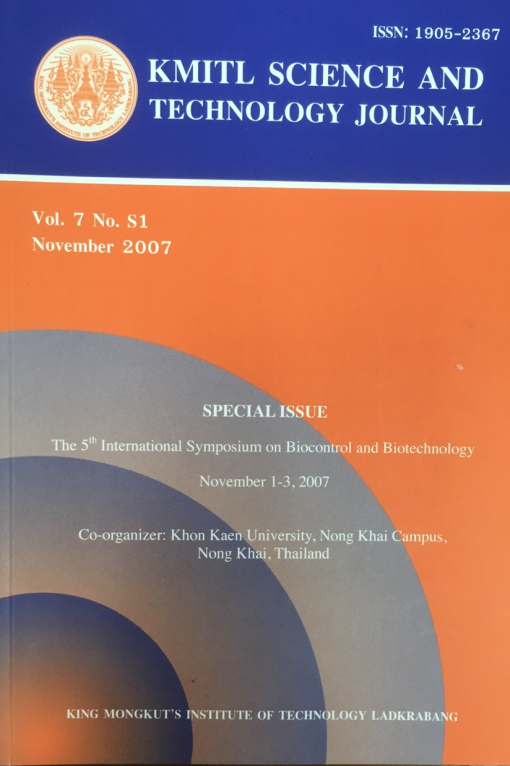ETHANOL PRODUCTION FROM JERUSALEM ARTICHOKE BY ZYMOMONAS MOBILIS IN BATCH FERMENTATION
Main Article Content
Abstract
Jerusalem artichoke (Helianthus tuberosus L.) is one of the most suitable materials for ethanol production as it contains nearly 20% of carbohydrates, 70-90% of which is inulin. In the present study, the batch ethanol fermentation of Jerusalem artichoke juices by the bacterium Zymomonas mobilis TISTR548 was investigated. Acid and enzymatic hydrolysis of inulin in Jerusalem artichoke juices were compared and the results show that acid hydrolysis at 80oC for 40 min using concentrated sulfuric acid gave the maximum reducing sugars content as well as ethanol yield (0.42 g g-1 utilized sugars) and ethanol productivity (0.65 g l-1 h-1) with 83.19% of the theoretical ethanol yield. Effect of initial pH of ethanol production medium and the inoculum size of Z. mobilis on ethanol production of acid hydrolyzed Jerusalem artichoke juices was determined. The results reveal that initial pH of 5.0 and 10% inoculum size exhibited the highest ethanol yield (0.47 g g-1 utilized sugars) and ethanol productivity (1.33 g l-1 h-1) with 92.75% of the theoretical ethanol yield, as compared to other conditions tested.
Keywords: Jerusalem artichoke, ethanol fermentation, inulin, Zymomonas mobilis, renewable energy
Corresponding author: E-mail: portha@kku.ac.th
Article Details
Copyright Transfer Statement
The copyright of this article is transferred to Current Applied Science and Technology journal with effect if and when the article is accepted for publication. The copyright transfer covers the exclusive right to reproduce and distribute the article, including reprints, translations, photographic reproductions, electronic form (offline, online) or any other reproductions of similar nature.
The author warrants that this contribution is original and that he/she has full power to make this grant. The author signs for and accepts responsibility for releasing this material on behalf of any and all co-authors.
Here is the link for download: Copyright transfer form.pdf
References
[2] Szambelan, K., Nowak, J. and Jelen, H. 2005 The Composition of Jerusalem Artichoke (Helianthus tuberosus L.) Spirits Obtained from Fermentation with Bacteria and Yeasts, Engineering Life Science, 5(1), 68-71.
[3] Niness, K.R. 1999 Inulin and Oligofructose: What are They?, Journal of Nutrition, 129, 1402-1406.
[4] Chubey, B.B. and Dorell, D.G. 1974 Jerusalem Artichoke – a Potential Fructose Crop for the Prairies, Canadian Institute of Food Science and Technological Journal, 7, 98-106.
[5] Dorell, D.G. and Chubey, B.B. 1977 Irrigation, Fertilizer, Harvest Dates and Storage Effects on the Reducing Sugar and Fructose Concentration of Jerusalem Artichoke Tubers, Canadian Journal of plant Science, 57, 591-596.
[6] Swanton, C.J., Cavers, P.B., Clements, D.R. and Moore, M.J. 1992 The Biology of Canadian Weeds: 101 Helianthus tuberosus L., Canadian Journal of Plant Science, 72, 1367-1382.
[7] Swings, J. and Deley, J. 1977 The Biology of Zymomonas mobilis, Bacteriology Reviews, 41, 1-46.
[8] Sprenger, G.A. 1996 Carbohydrate Metabolism in Zymomonas mobilis: a Catabolic Highway with Some Scenic Routes, FEMS Microbiology Letters, 145, 301-307.
[9] Szambelan, K., Nowak, J. and Chrapkowska, K.J. 2004 Comparison of Bacterial and Yeast Ethanol Fermentation Yield from Jerusalem Artichoke (Helianthus tuberosus L.) Tubers Pulp and Juices, Acta Science Pol. And Technologia Alimentaria, 3(1), 45-53.
[10] Miller, G.L. 1959 Use of Dinitrosalicylic Acid Reagent for Determination of Reducing Sugar, Analytical Chemistry, 31, 426-428.
[11] Dobois, M., Gilles, K.A., Hamilton, J.K., Robert, P.A. and Smith, F. 1956 Colorimetric Method for Determination of Sugar and Related Substances, Analytical Chemistry, 28, 350-356.
[12] Lingyun, W., Jianhua, W., Xiaodong, Z., Da, T., Yalin, Y., Chenggang, C., Tianhua, F. and Fan, Z. 2007 Studies on the Extracting Technical Conditions of Inulin from Jerusalem Artichoke Tubers, Journal of Food Engineering, 79(3), 1087-1093.
[13] Nakamura, T., Ogata, Y., Hamada, S. and Ohta, K. 1996 Ethanol Prodction from Jerusalem Artichoke Tubers by Aspergillus niger and Saccharomyces cerevisiae, Journal of Fermentation and Engineering, 81(6), 564-566.
[14] Szambelan, K., Nowak J. and Czarnecki, Z. 2004 Use of Zymomonas mobilis and Saccharomyces cerevisiae Mixed with Kluyveromyces fragilis for Improved Ethanol Production from Jerusalem Artichoke Tubers, Biotechnology Letters, 26: 845-848.


